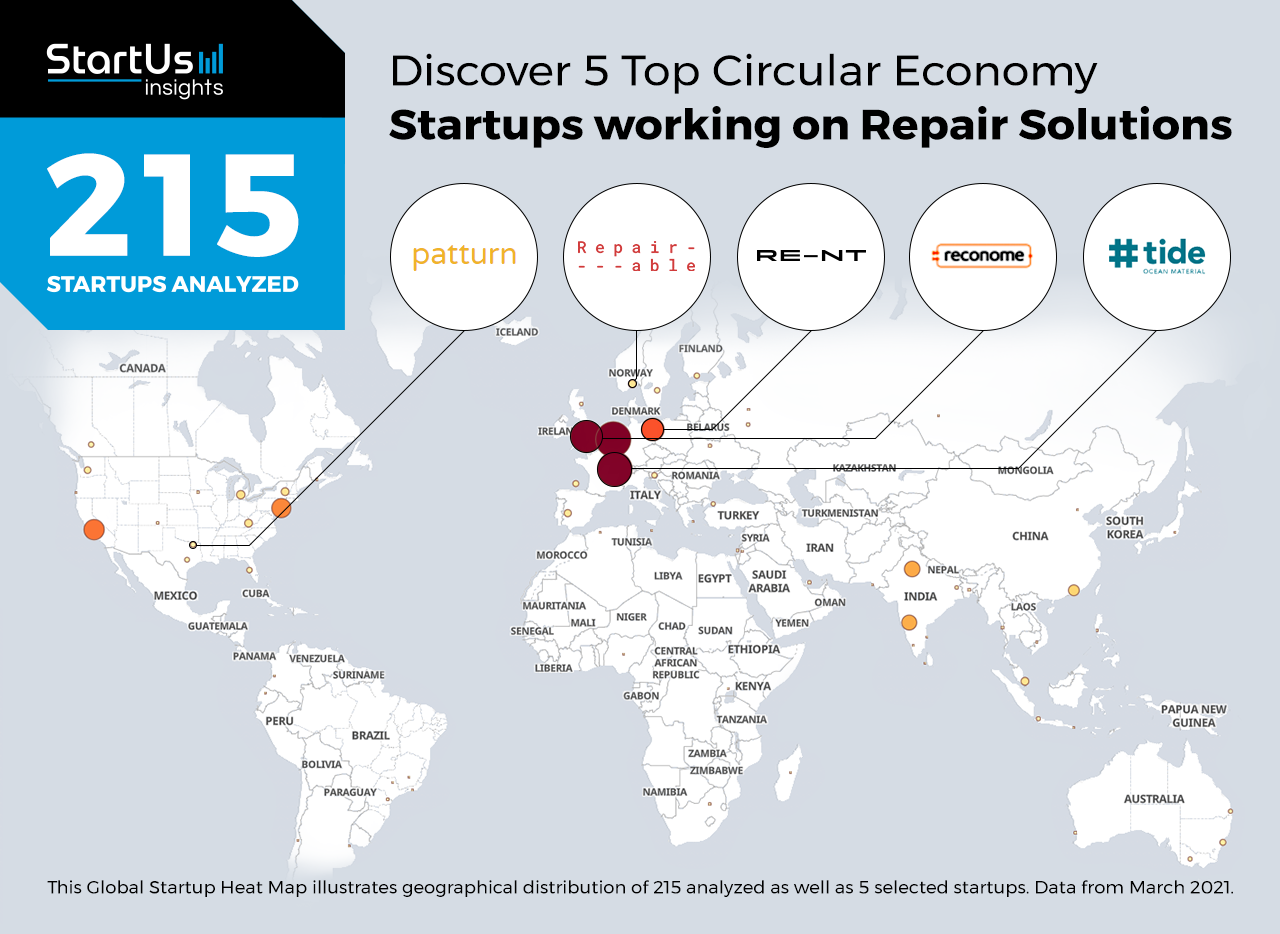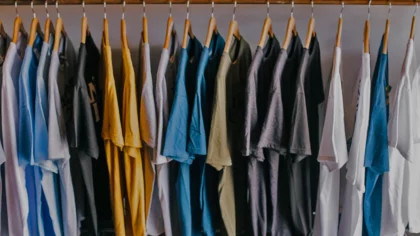Staying ahead of the technology curve means strengthening your competitive advantage. That is why we give you data-driven innovation insights into the circular economy. This time, you get to discover 5 hand-picked startups working on repair solutions.
Global Startup Heat Map highlights 5 Top Repair Solutions out of 215
The insights of this data-driven analysis are derived from the Big Data & Artificial Intelligence-powered StartUs Insights Discovery Platform, covering 1.379.000+ startups & scaleups globally. The platform gives you an exhaustive overview of emerging technologies & relevant startups within a specific field in just a few clicks.
The Global Startup Heat Map below reveals the distribution of the 215 exemplary startups & scaleups we analyzed for this research. Further, it highlights 5 circular economy startups that we hand-picked based on criteria such as founding year, location, funding raised, and more. You get to explore the solutions of these 5 startups & scaleups in this report. For insights on the other 210 repair solutions, get in touch.
Reconome facilitates a Sustainable Economy of Electronics
People frequently replace their electronics these days, even when their previous gadgets are still functional. The disposal of electronic waste has a negative environmental impact. Moreover, the mining of rare-earth metals for use in new electronic devices further contributes to carbon emissions. This is why circular economy startups provide solutions to extend the life cycle of electronic devices.
British startup Reconome provides repair and refurbishing solutions to enable a sustainable economy of electronics. It allows consumers to recycle electronics sustainably as well as buy refurbished devices. For businesses looking to recycle electronics, it collects the devices, wipes the data, and offers sustainability reports. With refurbished devices, it allows businesses, as well as individuals, to lower their hardware costs and carbon footprints.
Repairable advances Repair in Retail
Due to a lack of affordable repair solutions, as well as fast fashion, consumers often find it more convenient to buy new goods instead of repairing damaged ones. Circular economy startups and companies are changing that with repair solutions for retail items. These solutions close the product life cycle loop and reduce material use in the development of new products.
Repairable is a Norwegian startup enabling repair in retail. It allows consumers to either drop faulty products or schedule a home pickup and employs a team of certified repairers that fix them. This includes jackets, waterproof clothing, shoes, bags, leather clothes, and interior items. By extending the life of these products, the startup advances the circular economy.
RE-NT enables Circular Fashion
Production of garments requires large amounts of water and chemicals, thereby contributing to a significant fraction of global greenhouse gas emissions. Due to fast fashion trends, people now tend to buy more clothes than they can wear. Most clothes are not recycled and end up in landfills. To address this, startups are working on circular economy solutions that make it easier to recycle clothes.
German startup RE-NT offers technology solutions for circular fashion. The startup’s unique RE-NT ID allows tracking information of material composition and design process for clothing items. The startup also offers consulting for sustainability goals, rental software, a fulfillment solution, and a recycling network. RE-NT’s solutions make it easier for brands and retailers to rent, resale, and recycle clothes.
Tide Ocean Material repairs Degenerated Plastics
Most plastics are difficult to recycle and end up in oceans where they hurt the marine ecosystems. Even when recycled, plastics lose value with every cycle until they are incinerated or end up in oceans again. Circular economy solutions seek to upcycle plastic waste into high-value raw materials. This lengthens the lifetime of plastics as well as allows different industries that use these raw materials to lower their carbon footprint.
Swiss startup Tide Ocean Material develops waste-to-value solutions for ocean-bound plastic. It collects different kinds of plastics and converts them into #tide, a versatile granular material. The #tide granules find applications in plastic injection for the manufacturing of electronic devices, automotive parts, and other plastic products. The startup also produces #tide yarn and #tide filament for use in textiles and 3D printing, respectively.
Patturn works on Reverse Logistics
Consumers often return the products bought from online retailers. Moreover, many products still have life left after the consumers discard them. If not resold via appropriate channels, such products are often incinerated or end up in landfills. Reverse logistics solutions close the loop of product life cycles and help businesses capture more value from such products.
Patturn is a US-based startup developing a re-commerce solution. It collects pre-owned products from retailers, thrift sellers, and consignment stores. It then repairs and repackages these products, enabling their reintroduction in online and offline stores. The startup’s re-commerce management platform simplifies inventory management, warehouse management, multichannel sales, shipping, and purchasing.
Discover more Circular Economy Startups
Circular economy startups such as the examples highlighted in this report focus on plant-based products, artificial proteins, recycling technologies as well as innovative materials. While all of these technologies play a major role in advancing the circular economy, they only represent the tip of the iceberg. To explore more sustainable technologies, simply get in touch to let us look into your areas of interest. For a more general overview, you can download our free Industry Innovation Reports to save your time and improve strategic decision-making.









